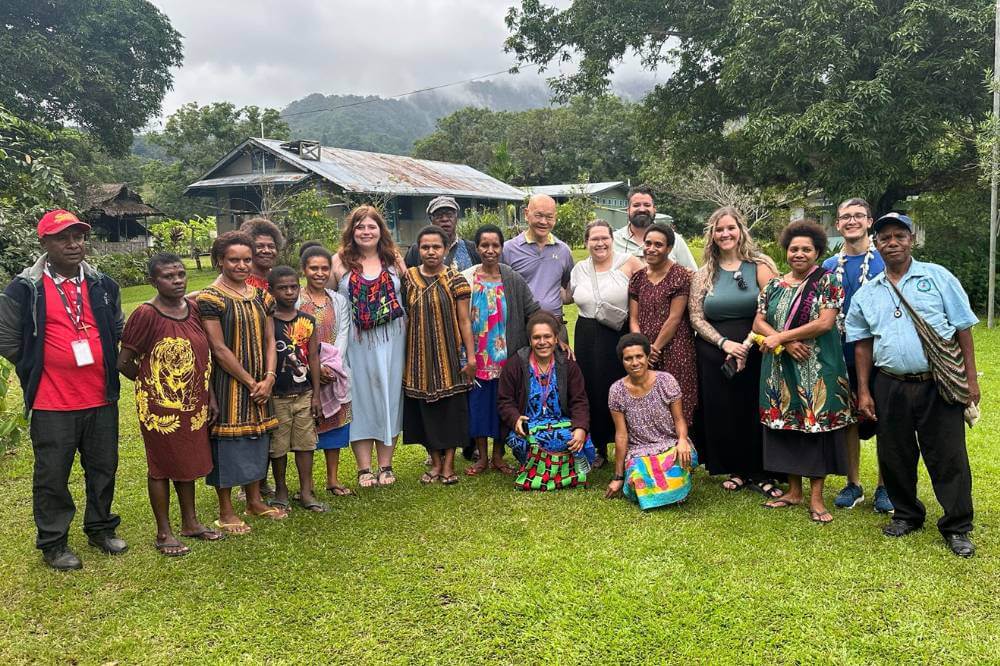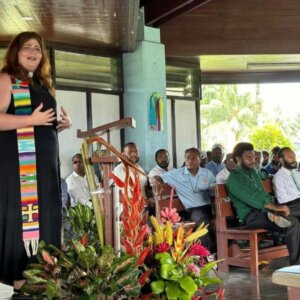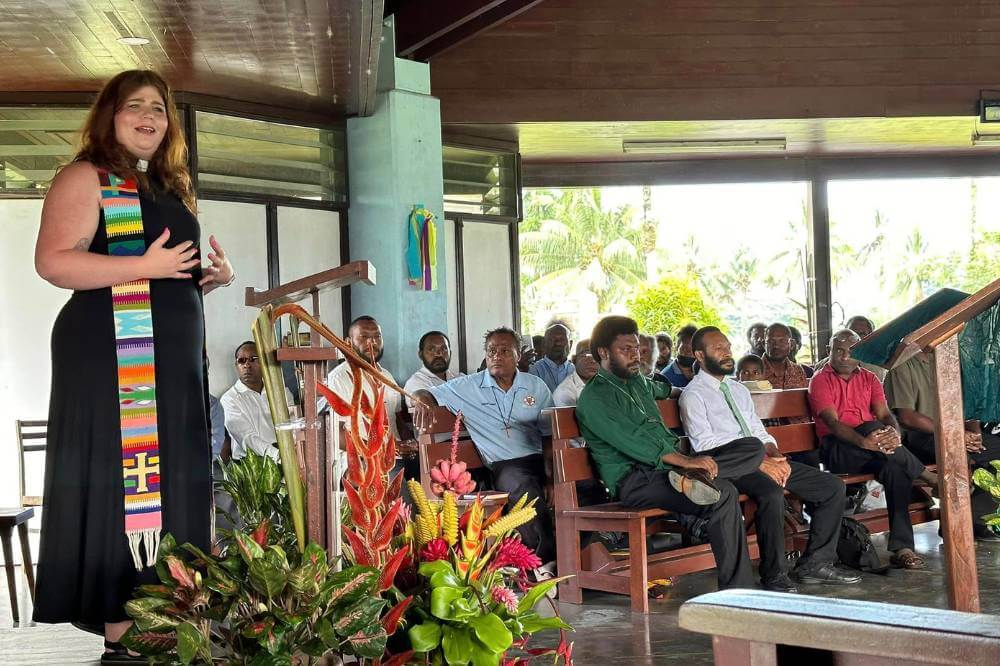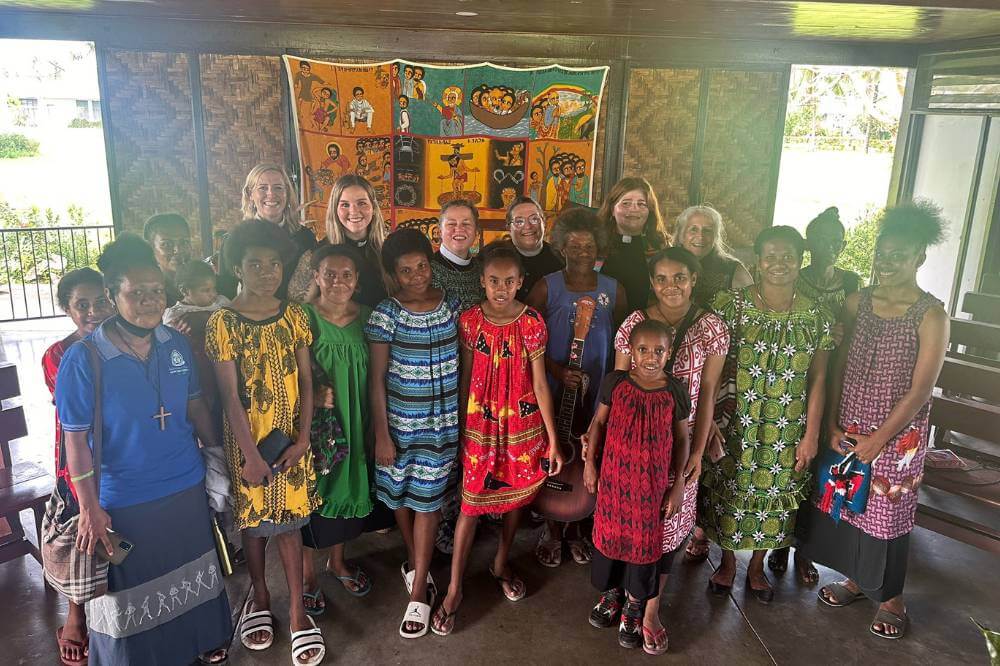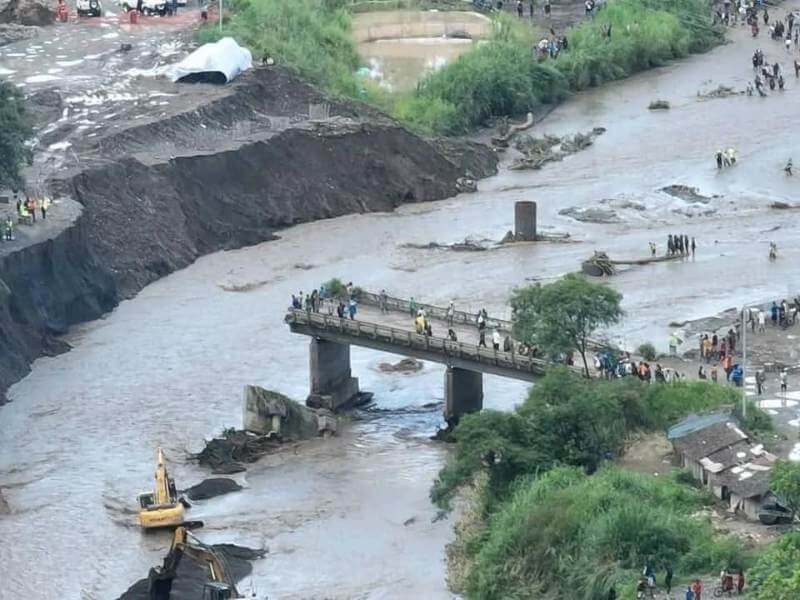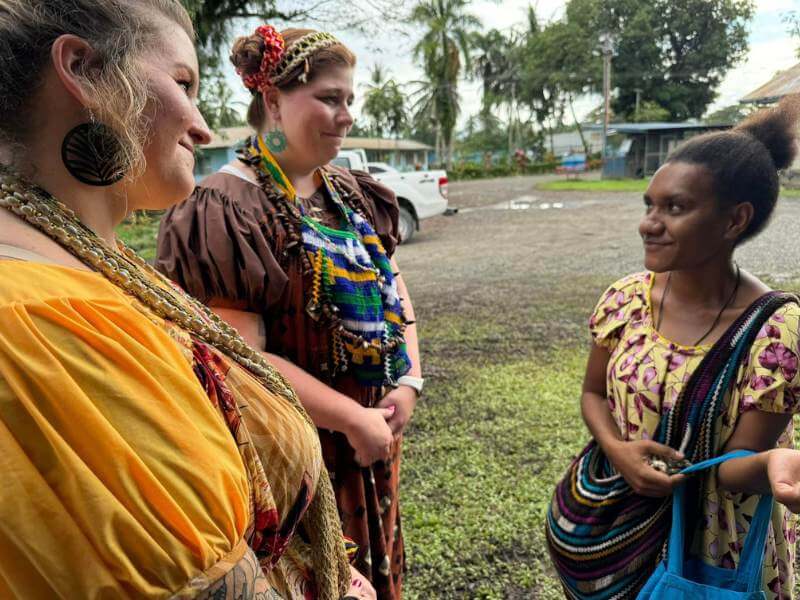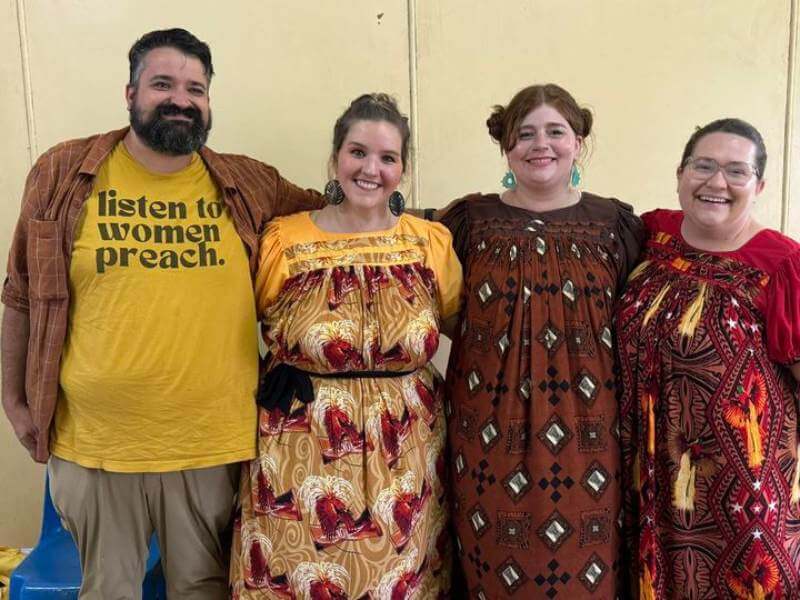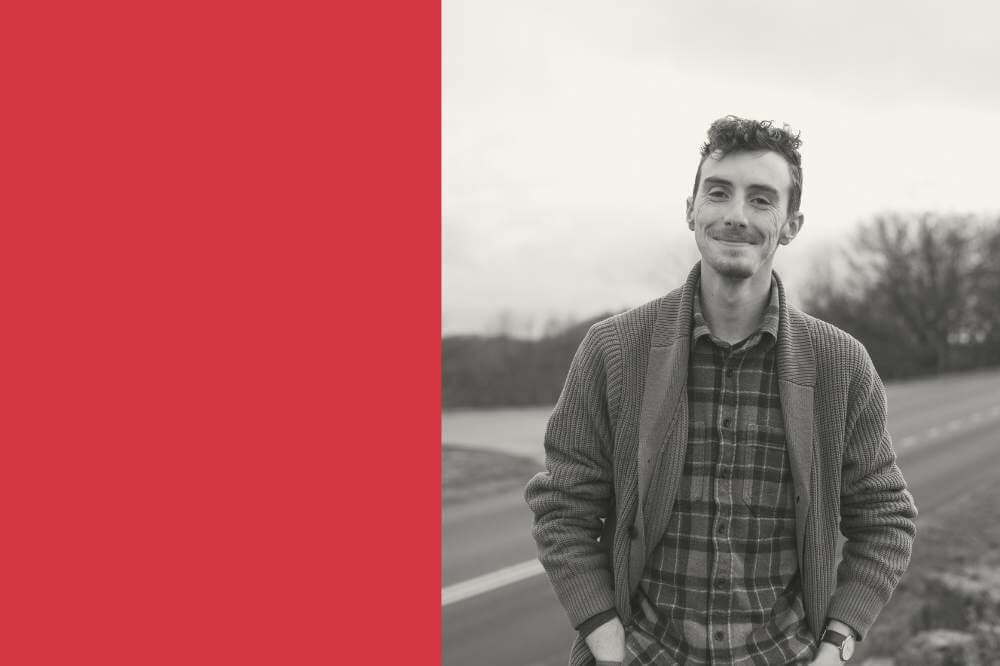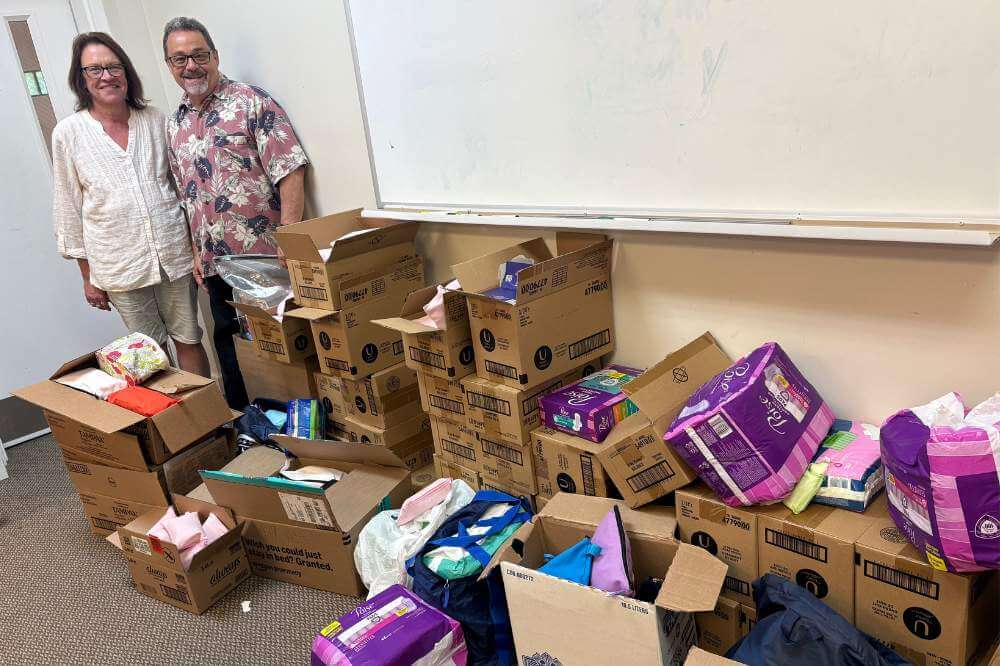Image credit: Franklin Ishida, ELCA
Just a few weeks ago, four North Carolina Synod pastors—Emily Harkins Norris (The Dwelling, Winston-Salem), Cassie Overcash (Assistant to the Bishop), Ethan Overcash (Emmanuel, High Point), and Julie Tonnesen (Elon Campus Ministry)—returned to North Carolina from an accompaniment trip in Papua New Guinea. And given that their journey included nearly-missed flights, helicopter crashes, bridges destroyed by landslides, and 40 hours of international travel, it would be reasonable to think that any of these events would be the biggest news to come from this trip. But they weren’t. Far from it.
Their trip to Papua New Guinea was a collaboration between four ELCA Synods—Virginia, Central States, Northwest Lower Michigan, and North Carolina—and the Evangelical Lutheran Church in Papua New Guinea (ELCPNG). And for some of these pastors, defining and explaining the nature of the work they intended to conduct was of the utmost importance. Acknowledging that “‘mission’ work has a deep and dark history, often rooted in colonialism and conflated with exerting power,” Pastor Julie Tonnesen explains via Substack:
If you define ‘mission trip’ as a group of (likely white) Christians proselytizing and evangelizing to folks (like BIPOC) who have never heard the Gospel before, the answer is a loud and resounding no. If you’re open to thinking about mission work as engaging in relationships with Christians around the world to experience God’s love and join in God’s work together, the answer is yes, and Amen!
This idea of walking together—or wokabaut wantaim in Tok Pisin, one of the four official languages of Papua New Guinea—was the focus of Day 1, according to Pastor Ethan Overcash. “Our partners loved us before they met us. They sang a song to us the first day where the last line, Yu no save long mi, na mi no save long yu, tasol nau Jisas i bungim yumi, means, ‘You don’t know me, I don’t know you, but we are together in Christ.’ Our partners are joyful disciples walking with us together in faith and they love us—because we are Church together.”
And without a doubt, that love was returned in full, with Pastor Julie recounting “[days] filled with conversation, laughter, a few tears, sing-sings (traditional welcome ceremonies), feasts, and so much sweat. This is Holy Ground.”
Of course, healthy relationships between individuals and communities alike do not arise spontaneously but require commitment and vulnerability from all parties involved.
“[We] (our partners and us) landed on an understanding that vulnerability is ‘me being willing to be changed by you and you being willing to be changed by me,’” Pastor Ethan explains. “It’s an understanding crucial to walking with others, because if we do not enter relationships with humility and vulnerability, then we will not be in an even or equal relationship.”
Humility and vulnerability are essential to breaking down emotional walls between people, but what about physical walls? As it turns out, these pastors have a unique story about that, as well.
“We then went to the village [of Gadmazung] proper where we were met with a literal wall,” says Pastor Ethan. “The village leaders were on one side and us on the other and they asked us why we were there and who we were, to which we responded, ‘We come in peace from North Carolina in the name of Jesus Christ!’ They immediately began tearing the wall down and the singing and dancing began!”
Another theme that arose out of these reflections on love, vulnerability, peacemaking, and interconnectedness was the beauty of diversity and the enduring need to cherish our shared humanity. In response to her trip, Pastor Emily speaks about the experience of “[settling] into being community together,” noting that the shared experiences of dancing, breaking bread together, children playing, and even “church ladies bickering” reminded her of her own community of faith back home:
What’s truly remarkable is that once we get past the novelty of the differences, we start to see just how much we have in common. We may express our values and hopes in different ways, through different customs, but the core of what we desire—love, safety, joy, and connection—remains the same.
Of course, we not only share joy across cultural lines but challenges and obstacles, as well. Pastor Cassie Overcash notes, “We shared similar struggles of equipping lay leaders, stewardship, and evangelism. It was interesting to me that they were having some of the same struggles in ministry that I am in conversation about so often at home!”
The conversation about women in ministry also took center stage in their dialogues. While the ELCA recently celebrated 50 years of ordained ministry for women, in the ELCPNG, women cannot be ordained.
“One of the highlights of the trip for me was getting to hear Pastor Cassie preach in the Chapel at Martin Luther Seminary,” Pastor Julie said when asked to share some of her favorite moments. “After the service, all of the female pastors from the ELCA got together to take some pictures, and before we could even get a picture of the six of us, dozens of women and girls who were at worship with us flocked to us to take a picture together. As the cameras snapped, more and more women and girls crowded into the frame. It was such a joyful moment and reminded me of the power of representation. It made me immensely hopeful that one day, everyone who feels called to ministry, regardless of where they live or what identity markers they hold, will have their gifts for ministry affirmed and opportunities to serve.”
“They proudly introduced us as pastors to everyone we met,” Pastor Cassie adds, “even though for many people we were the first female pastors they were meeting. They were abundantly respectful and proud to have three women pastors with them.”
And, while the collapsed bridge may not have been the “biggest news” from this trip, it would be irresponsible and inaccurate to overlook its devastating impact on the people of Papua New Guinea. One of Pastor Emily’s Facebook posts offers details originally written by Pastor Ethan:
It rained non-stop Thursday evening through Friday, and with it came a landslide that washed out the Yalu Bridge Friday afternoon—the only route to the airport….We were able to make our rescheduled flight….All that to say, we may be grateful to have made it out but our hearts and minds are also still there with our partners whose homes have been so ravaged by the flooding and the subsequent economic and countless other impacts of the bridge collapse. Much of the goods that make up the economy of the region come across that bridge every day, and every village we visited is now separated from the region’s city… Join us in holding these dear people in our prayers and hearts.
Those familiar with ELCA liturgy are likely familiar with the words, “Remember us in your kingdom, and teach us to pray.” It’s a question both ancient and modern; just a few days prior, Pastor Julie shared these thoughts on prayer from a Mary Oliver poem that played on repeat in her mind as she awaited the flight to Port Moseby, Papua New Guinea’s capital city:
I don’t know exactly what a prayer is.
I do know how to pay attention, how to fall down
into the grass, how to kneel down in the grass,
how to be idle and blessed, how to stroll through the fields,
which is what I have been doing all day.
May we be idle and blessed and live each day as a prayer.
For those of us who still find ourselves asking the question of how to pray, or what a prayer even is, perhaps the answer truly is to pay attention—to take note of the wants and needs and hopes and dreams and desires of those outside of ourselves, and to respond in ways that are shaped and formed by love.
Because at the end of the day, the biggest news that came out of Papua New Guinea is the very same good news that seems to resonate throughout all of human history: that God is busy at work through the actions and testimonies of those who seek to change the world by loving it fiercely.
Faithful givers of the North Carolina Synod, thank you—tenkyu!—for your many gifts which have allowed the tending of this special and holy relationship with Lutherans on the other side of the world! Your Mission Support dollars support this accompaniment and the blessing of being church together with God’s people in a place different from our own.
Story Attribution:
Madelyn Jones for the NC Synod
